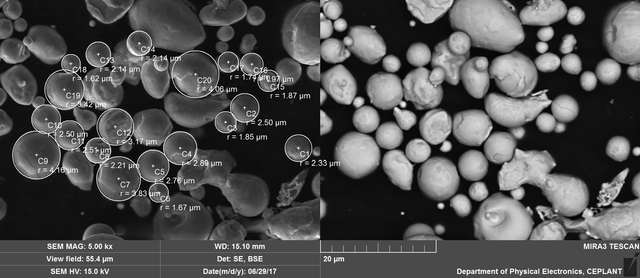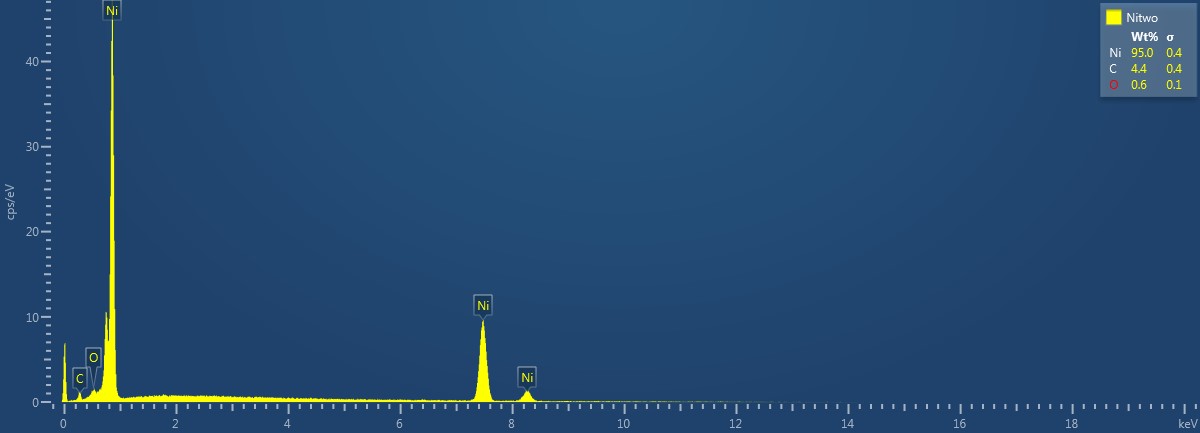There were two type of fuels that Suahas sent us, one with and another without Molybdenum. He also sent us a sample of this Molybdenum for testing. Here is a shot of the packaging and it laying on the SEM table ready for analysis.

Under the microscope

The manufacturer quoted that this powder should have an average particle size of 30um, however, it was well below that. This is not the first time that quoted figures were well of the actual.
Elemental composition

Not an atom of Molybdenum in sight - this came as quite a shock to Suhas Ralkar as he had spent 100s of hours processing the fuel samples and running them in the reactor on the assumption that the supplier had delivered what he was supposed to, only to find out they had sent him a different mesh size of pure nickel!
When the so called 'reputable' supplier was informed of the error, their response was, oh, yeh, sorry.
Conclusion
It is clear from testing various Suhas input feedstocks, that suppliers are economical with the truth at best and plain wrong at other times. Particle sizes were wrong in most cases - however, in this case, the wrong element was supplied.
This just goes to show the importance of having SEM and EDX to hand when conducting this kind of research, otherwise, you may be working with completely different structures and materials to what you thought you were.
Of course, this does mean that none of the ECCO fuel and ash supplied for analysis had Molybdenum in it, but at least those using this powder had a different average Nickel particle size.
The ECCO reactor looks very not professional. The use of material quality is also very uncertain. ECCO Reactor Does it really work? thank you all
Downvoting a post can decrease pending rewards and make it less visible. Common reasons:
Submit
Sometimes the most important discoveries happen due to serendipity - knowing what was used where is the most important thing when understanding outcomes.
The reactor was designed and its manufacturing could be controlled - however, many researchers across the world rely on their material suppliers to NOT be lying about, or mis-representing what they supply. 'Professional' organisations can be victim of this also.
With around a million dollars spent on developing ECCO, it is extremely cheap by standards in the field, so on that measure it could be considered amateur, however, it is still a lot of money and the outcome is what is important.
The material supplier, who apparently is quite respected, has been the unprofessional party in this.
Downvoting a post can decrease pending rewards and make it less visible. Common reasons:
Submit
I saw your latest video on YouTube. Are those powders taken from the reactor? The neutron bubble detector seems to have detected neutrons. Thank you !
Downvoting a post can decrease pending rewards and make it less visible. Common reasons:
Submit
It has, we will do a background test after the radiographic plate exposure.
Downvoting a post can decrease pending rewards and make it less visible. Common reasons:
Submit
It is best to detect these powders using gamma spectrometers and He-3 neutron detectors.
Downvoting a post can decrease pending rewards and make it less visible. Common reasons:
Submit
Yes, don't have any here. Got a gamma, beta, alpha detector on way. Might approach University
Downvoting a post can decrease pending rewards and make it less visible. Common reasons:
Submit
Thanks to all
Downvoting a post can decrease pending rewards and make it less visible. Common reasons:
Submit
Very good post.Please visit my blog https://steemit.com/@kishore1988
Downvoting a post can decrease pending rewards and make it less visible. Common reasons:
Submit